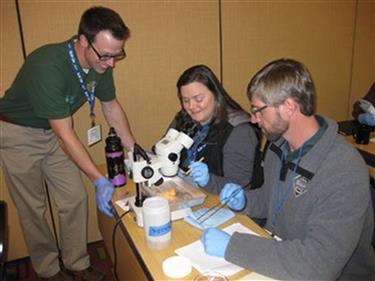2019 Meeting of the NC Chapter of the American Fisheries Society
The Historic Brookstown Inn
Winston-Salem, NC – February 19-21, 2019
Join us at the 30th Annual Meeting of the NC Chapter of the AFS. Our host will be The Historic Brookstown Inn, located at 200 Brookstown Ave, Winston-Salem, NC, 27101. Email NCAFS President-Elect Jake Rash if you have questions or are interested in assisting with meeting execution. Additionally, the NC Mollusk Working Group will be meeting in the same location on February 19th.
Quick Content Links
Schedule & Program
- Tue, Feb. 19th
- 10:00 am – 5:00 pm: NC Mollusk Working Group Meeting (contact organizer for details)
- 6:30 – 10:00 pm: Social
- Wed, Feb. 20th
- 8:00 – 11:30 am: Aquatic Nuisance Species Workshop
- 7:30 am – 6:00 pm: Registration Open
- 1:00 – 6:00 pm: Oral Presentations
- 7:00 – 10:00 pm: Poster Presentations/Dinner/Raffle
- Thu, Feb. 21st
- 8:30 am – 11:05 pm: Oral Presentations
- 12:30 -2:30 pm: NCAFS Business Meeting/Awards
Click here for live responsive abstract page
2018 Business Meeting Minutes For Review
The minutes from the 2018 Chapter Business Meeting are available here for review prior to approval at our 2019 Business Meeting on Thursday, February 21st.
Abstracts
Abstracts accepted for oral & lightning presentations. Topics addressing any aspect of fisheries and related aquatic sciences are welcomed, including, but not limited to, management, research, conservation, outreach and education. Presentations will be limited to 20 minutes (including a question & answer period). Abstracts limited to 300 words or less.
Lightning Talks
5 minute talks, 2 minute question/answer for each (PowerPoint optional), for students & professionals to present new projects or programs, results from ongoing work, emerging issues, and other research or management briefs.
Poster Presentations
Posters should contain succinct headings that organize & logically display the information. Graphics should be explicit & brief. Elaboration is best done verbally, just as if it were an oral presentation using slides. A short & legible “Introduction” and a “Summary of Conclusions” are essential. The poster display should focus on (1) Hypothesis/Objective, (2) Methods, and (3) Results/Outcomes. Click to view/download detailed poster guidelines.
Submission deadline for all sessions: Closed
Judges will be scoring all presentations for awards in both the professional and student categories.
Registration
Meeting registration is now $85 for professionals who are NCAFS members, $60 for students & retirees, $110 for non-chapter-members. Workshop registration is $25 for NCAFS members, $30 for non-members. Please note the following reminders:
- You may join or renew your NCAFS membership as part of registration. If you would like to pay your dues separately, visit our online membership form here. Both allow either electronic or mail-in submission & payment.
- Deadline for early registration fees ended February 8, 2019. A late fee of $10 has been added to all registration costs after this date.
Continuing Education Course
Topic: Aquatic Nuisance Species in NC – where we are, where we are headed, and things we can do to help!
Workshop Fee: $15 (NCAFS Members)/$20 (Non-Members)
Join us for a morning of engaging talks about a variety of aquatic nuisance species (ANS) in NC. We’ll discuss some of the major ANS issues in NC, current control efforts, and what we as NCAFS members can do to help. To assist us on this journey, we have assembled a diverse group of knowledgeable & willing instructors to lead the workshop.
They include:
- Chris Goudreau, NC Wildlife Resources Commission Biologist & NC ANS Management Plan Steering Committee member, will introduce and discuss the NC ANS Management Plan.
- Bryn Tracy, retired fisheries biologist, will discuss nuisance freshwater fish species – the good, the bad, and the ugly.
- NC Wildlife Resources Commission Aquatic Wildlife Diversity staff members TR Russ, Luke Etchison, & Dylan Owensby will provide information about nuisance crayfish and mollusks.
- Erika Haug & Jessica Baumann, with the NC State University Aquatic Plant Management Program, will highlight aquatic nuisance plant issues.
Lodging and Reservations
Accommodations will be provided at the Historic Brookstown Inn. A block of rooms has been reserved under the name “NCAFS,” with a nightly rate of $71.20 for a king or double room. This rate will only be valid if reserved by February 5, 2019. To book your stay using this rate, call the hotel at 800-845-4262.
Meeting Sponsors
Many thanks to our generous sponsors:
Presentation Scoring Criteria
Presenters: To assist you in putting together an award-winning presentation, below are the judging criteria for both professional and student papers. You may also download a .pdf version of the scoresheet.
In a 5-point category, judges award 3 points for average quality (even though average quality may be very good), 4 for above average, and 5 for outstanding.
A. Individual Components (5 points for each)
- Title – Does it accurately describe the subject?
- Introduction – Does it provide adequate background, a historical context, and justification for the study? Were the objectives and purpose clearly stated?
- Methods or Approach – Are they described with sufficient detail?
B. Content
- Structure and Organization (15 points) – Is there logical development and integration of the presentation? Is the presentation comprehensible by members of the audience not engaged in that particular specialty?
- Originality (10 points) – How valuable is the presentation in communicating and presenting unique or innovative methods, concepts, or interpretations? How relevant and significant is it to fisheries science?
- Analytical Merit (10 points) – Are the analytical methods and study design or approach adequate and appropriate?
- Technical Merit (10 points) – Are interpretations consistent with the results or evidence presented? Are limitations identified and evaluated?
C. Physical Presentation
- Delivery (15 points) – Does the presenter employ good voice quality, enthusiasm, grammar, eye contact, posture and body language, pronunciation, and articulation?
- Visual Aids (15 points) – Are the visual aids large enough, simple, understandable, relevant, and attractive?
- Timing (5 points) – Does the presenter complete the talk within the allotted time, and leave time for questions?
D. Other Considerations (5 points)
- Use this category to reward unique or attractive features which do not fit exactly into other criteria (e.g., judicious and effective use of humor). It should be considered an extra and should not be awarded automatically.
E. Comments
- Provide a brief evaluation of your impressions of each presentation. Comments will be used to break ties.

Tyler Black showing Jennifer Archambault & Michael Fisk the finer points of crayfish identification during the 2015 NCAFS Annual Meeting. View this & other past Continuing Education Courses.





